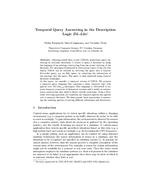Temporal Query Answering in the Description Logic {\textit{DL-Lite
|Year=2013 |Month= |Booktitle=Proceedings of the 9th International Symposium on Frontiers of Combining Systems ({FroCoS 2013}) |Editor=Pascal {Fontaine} and Christophe {Ringeissen} and Renate A. {Schmidt} |Note= |Organization= |Pages=165--180 |Publisher=Springer |Series=Lecture Notes in Computer Science |Volume=8152 |To appear=0 }}
Temporal Query Answering in the Description Logic {\textit{DL-Lite
Stefan BorgwardtStefan Borgwardt, Marcel LippmannMarcel Lippmann, Veronika ThostVeronika Thost
Temporal Query Answering in the Description Logic {\textit{DL-Lite
- KurzfassungAbstract
Ontology-based data access (OBDA) generalizes query answering in relationaldatabases. It allows to query a database by using the language of an ontology, abstracting from the actual relations of the database. For ontologies formulated in Description Logics of the DL-Lite family, OBDA can be realized by rewriting the query into a classical first-order query, e.g. an SQL query, by compiling the information of the ontology into the query. The query is then answered using classical database techniques.
In this paper, we consider a temporal version of OBDA. We propose a temporal query language that combines a linear temporal logic with queries over DL-Lite_core-ontologies. This language is well-suited to express temporal properties of dynamical systems and is useful in context-aware applications that need to detect specific situations. Using a first-order rewriting approach, we transform our temporal queries into queries over a temporal database. We then present three approaches to answering the resulting queries, all having
different advantages and drawbacks. - Forschungsgruppe:Research Group: AutomatentheorieAutomata Theory
@inproceedings{ BoLiTh-FroCoS13,
address = {Nancy, France},
author = {Stefan {Borgwardt} and Marcel {Lippmann} and Veronika {Thost}},
booktitle = {Proceedings of the 9th International Symposium on Frontiers of Combining Systems ({FroCoS 2013})},
editor = {Pascal {Fontaine} and Christophe {Ringeissen} and Renate A. {Schmidt}},
pages = {165--180},
publisher = {Springer-Verlag},
series = {Lecture Notes in Computer Science},
title = {Temporal Query Answering in the Description Logic {\textit{DL-Lite}
,
volume = {8152},
year = {2013},
}
}}
